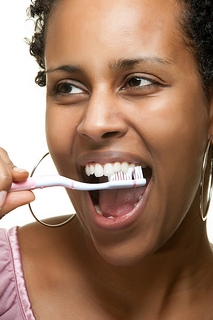Teeth Grinding
August 14th, 2024

If you are waking up with jaw pain, tension headaches, or facial pain, you may be suffering from a condition known as bruxism. This means you could be grinding or clenching your teeth while you sleep. Some people aren’t even aware they are grinding or clenching their teeth at night, until a visit to us reveals significant tooth enamel loss. Fortunately, there is a non-invasive and effective solution for teeth grinding, and the tooth enamel damage it can cause, in custom-fabricated nightguards.
Causes of teeth grinding
Tension, stress, and anxiety experienced during the daytime can carry over to an individual’s sleep, and lead the person to grind his or her teeth together or clench the teeth unknowingly. Sleep apnea is another condition that can result in bruxism. Regardless of the cause, however, frequent clenching and teeth grinding wears down the chewing surfaces of the teeth, reduces tooth enamel, and can result in a cracked or chipped tooth, crown, or filling.
Nightguards for teeth grinding
Custom nightguards are fabricated to fit like a glove and protect your teeth from the adverse effects of bruxism. Nightguards are created through a non-invasive process that simply takes an impression of the bottom and top rows of teeth. The result is a nightguard that is flexible, comfortable, and personalized to your mouth.
Benefits of nightguards
Nightguards are helpful to reduce or eliminate the symptoms of dental damage incurred as a result of teeth grinding. They can reduce the discomfort associated with a sore jaw, headaches, tooth sensitivity, ear pain, and facial pain that many patients experience as a result of clenching or grinding of their teeth. In severe cases of bruxism, patients can develop loss of hearing, jawbone misalignment, and TMJ. Therefore, customized nightguards can help prevent the progression of teeth grinding into these more serious conditions.
At-home tips to reduce or prevent teeth grinding
Although it’s important to wear your nightguard faithfully if you grind your teeth at night, you can follow a few self-care tips to help to prevent your teeth grinding from worsening.
- Reduce tension and stress. Whether you take a warm bath before bed, listen to soothing music, or exercise, practice stress-relieving activities to wash away the tensions of the day.
- Avoid alcohol. In some patients, alcohol increases teeth grinding tendencies.
- Avoid caffeine. In some individuals, caffeine increases the likelihood of teeth grinding.
- Focus on relaxing jaw muscles. Make a conscious effort to keep your jaw relaxed. A warm washcloth against your cheek, sticking your tongue between your teeth, and avoiding chewing pencils, pens, and gum are all ways to train the muscles of your jaw to stay relaxed.
If you suspect you may be grinding your teeth at night, visit Sandra Martin and our team at Sandra Martin Family Dentistry for an evaluation at our convenient Wake Forrest, North Carolina office.




